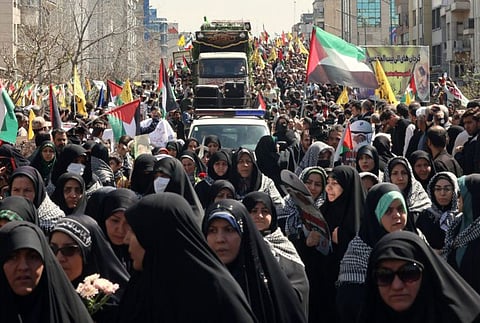Iran says Israeli embassies ‘no longer safe’ after Syria strike
Iran tells US to step aside as it readies response to Israel

TEHRAN: An adviser to Iran's supreme leader warned Sunday that Israeli embassies are "no longer safe" after a strike in Syria which Tehran blamed on Israel killed seven Revolutionary Guards members.
"The embassies of the Zionist regime are no longer safe," Yahya Rahim Safavi, senior adviser to Ayatollah Ali Khamenei, was quoted as saying by the ISNA news agency.
Tehran has vowed to avenge Monday’s air strike on Damascus that levelled the Iranian embassy’s consular annex, killing seven Islamic Revolutionary Guard Corps (IRGC) members including two generals.
“The resistance front is ready; how it (the response) will be, we have to wait,” Safavi said, noting that “confronting this brutal regime is a legal and legitimate right”.
He also noted that multiple Israeli embassies around the region “have been shuttered”.
There was no immediate comment from Israel.
Monday’s attack, which Britain-based war monitor the Syrian Observatory for Human Rights said killed 16 people, was the fifth raid on Syria in a week blamed on Israel.
Among the dead were generals Mohammad Reza Zahedi and Mohammad Hadi Haji Rahimi who were senior commanders in the Quds Force, the IRGC’s foreign operations arm.
Zahedi, 63, had held several commands during a career spanning more than 40 years.
He was the most senior Iranian soldier killed since a United States missile strike at Baghdad airport in 2020 killed Quds Force chief General Qasem Soleimani.
Monday’s strike in Damascus took place against the backdrop of the Gaza war which began with Hamas’s October 7 attack on Israel which killed 1,170 people, mostly civilians.
Tehran backs Hamas but has denied any direct involvement in the attack which sparked massive Israeli retaliation against the Gaza Strip.
The Hamas-run health ministry in the Palestinian territory says at least 33,175 people have been killed there during six months of war.
US on high alert
Iran does not recognise Israel, and the two countries have fought a shadow war for years.
The Islamic republic accuses Israel of having carried out a wave of sabotage attacks and assassinations targeting its nuclear programme.
CNN reported that the US is on high alert and is preparing for a “significant” response from Iran against Israeli or American targets in the region.
NBC, citing two unnamed US officials, said President Joe Biden’s administration is concerned any attack could be inside Israel, specifically against “military or intelligence targets, rather than civilians.”
The White House took the unusual step of communicating directly to Iran that the US was unaware Monday’s strike in Damascus would happen, Bloomberg reported. That suggested the US was trying to prevent its own forces and bases in the Middle East being attacked.
The Islamic Republic has said it will deliver a “slap” to Israel, its arch enemy. Still, it’s unclear when that would happen or whether Iran would try to attack Israel directly or through one of its proxy groups such as Hezbollah, based in Lebanon.
The airstrike hit the Iranian consulate in Damascus, killing at least seven Iranians, including two generals. While Israel has repeatedly targeted Iran-linked assets in Syria over the past few months, this was the first time an attack struck an Iranian diplomatic building.
Israel has been on alert since then, canceling home leave for combat troops, calling up reserves and bolstering air defenses. Its military scrambled navigational signals over Tel Aviv on Thursday to disrupt GPS-navigated drones or missiles that might be fired at the country.
Tensions between Israel and Iran have worsened since Israel’s war against Hamas “- another Islamist group backed by Tehran “- erupted in October.
Hezbollah’s leader, Hassan Nasrallah, on Friday said a response from Iran is undoubtedly coming. But, he said, his group won’t “interfere in such decisions.”
Read More: Tel Aviv GPS Scrambled as Israel Awaits Iran Revenge Attack
“And after that, how Israel will behave, the region would enter in a new phase,” Nasrallah said in a televised speech.
Nasrallah, who lives in hiding, highlighted the coordinated work of Iran’s so-called resistance groups in the region.
Hezbollah, the Middle East’s most powerful militia, said it’s yet to use its “primary arsenal” in the daily skirmishes with Israel along the southern border of Lebanon, which started soon after the Israel-Hamas conflict.
Hezbollah is “completely prepared and ready” for any war with Israel, Nasrallah said.
Sign up for the Daily Briefing
Get the latest news and updates straight to your inbox



